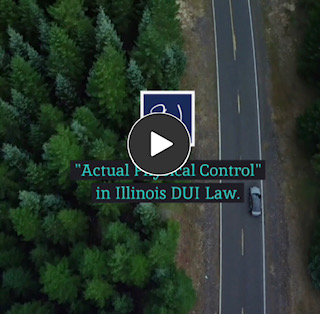- Free Consultation: (844) WIRTH-LAW Tap Here to Call Us
Actual Physical Control: The Rationale for Issuing a DUI When a Person Isn’t Driving

Many of our clients are confused about why they were issued a DUI ticket without having driven a vehicle. We attempt to explain the legal basis for the ticket, as well as the legislative rationale in this article.
Click here to view our explainer video on why Illinois includes “actual physical control” in their DUI law.
Many of our clients are confused about why they were issued a DUI ticket without having driven a vehicle. We attempt to explain the legal basis for the ticket, as well as the legislative rationale in this article.
Under the Illinois DUI law, it is unlawful to drive or be in “actual physical control” of any vehicle” while under the influence of drugs or alcohol. 625 ILCS 11-501. A person does not need to drive or intend to drive to be in “actual physical control” of a vehicle. Naperville v. Watson, 175 Ill. 2d 399, 402 (1997).
The term, “actual physical control” has been litigated extensively to determine what conduct falls within its’ parameters. Over time, the courts have developed a list of factors to consider when determining whether a person is in “actual physical control” of a vehicle while intoxicated, including whether the defendant (1) possessed the ignition key; (2) had the physical capability to operate the vehicle; (3) was sitting in the driver’s seat; and (4) was alone with the doors locked. People v. Slinkard, 362 Ill. App. 3d 855, 859 (2005).
The courts continue to decide whether a person was in “actual physical control” of a vehicle while intoxicated on a case-by-case basis. Although the above factors serve as guidance, the State does not need to prove all these factors, nor is the court limited to solely considering these factors if additional evidence exists that is relevant to determining “actual physical control.”
Many clients question the rationale for this provision in the law. We do recognize that the “actual physical control” portion of the DUI law disincentives persons from staying in their vehicle, with no intention of driving, when they know they are too intoxicated to safely operate a motor vehicle. We don’t necessarily agree with the real word effect.
The Illinois supreme court in Watson explained the legislative intent behind penalizing intoxicated persons for being in “actual physical control” of a vehicle under the DUI law. The court noted that the legislative intent was to encourage those who plan to drink to arrange lodging or safe transportation home in advance. They expressed concern about persons making decisions about safely getting home after their judgment is impaired, rather than before going out drinking. Watson, 175 Ill. 2d at 405.
The content of this blog post is not legal advice. Our office provides free consultations and is happy to review the specific facts of your case. You can reach us by calling 312.761.8290 or by emailing us at jennifer@wirthlaw.org.








